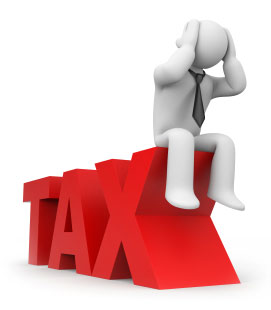|
Oops! Errors to Avoid at Tax Time
9 Mistakes You Can Avoid
 Errors
made on tax returns may delay the
processing of your tax return, which in
turn, may cause your refund to arrive
later. Here are nine common errors the
IRS wants you to avoid to help guarantee
your refund arrives on time.
Incorrect or missing Social
Security Numbers. When entering
SSNs for anyone listed on your tax
return, be sure to enter them exactly as
they appear on the Social Security
cards. Incorrect or
misspelling of dependent’s last name.
When entering a dependent’s
last name on your tax return, ensure
they are entered exactly as they appear
on their Social Security card.
Filing status errors.
Make sure you choose the correct filing
status for your situation. There are
five filing statuses: Single, Married
Filing Jointly, Married Filing
Separately, Head of Household, and
Qualifying Widow(er) With Dependent
Child. See Publication 501, Exemptions,
Standard Deduction, and Filing
Information to determine the filing
status that best fits your needs.
Math errors. When
preparing paper returns, review all math
for accuracy. Remember, when you file
electronically, the software takes care
of the math for you!
Computation errors. Take your
time. Many taxpayers make mistakes when
figuring their taxable income,
withholding and estimated tax payments,
Earned Income Tax Credit, Standard
Deduction for age 65 or over or blind,
the taxable amount of Social Security
benefits, and the Child and Dependent
Care Credit. Incorrect
bank account numbers for Direct Deposit.
If you are due a refund and requested
direct deposit, be sure to review the
routing and account numbers for your
financial institution.
Forgetting to sign and date the return.
An unsigned tax return is like an
unsigned check – it is invalid.
Incorrect Adjusted Gross Income
information. Taxpayers filing
electronically must sign the return
electronically using a Personal
Identification Number. To verify their
identity, taxpayers will be prompted to
enter their AGI from their originally
filed 2008 federal income tax return or
their prior year PIN if they used one to
file electronically last year. Taxpayers
should not use an AGI amount from an
amended return, Form 1040X, or a math
error correction made by IRS.
Claiming the Making Work Pay Tax
Credit. Taxpayers with earned
income should claim the Making Work Pay
Tax Credit by attaching a Schedule M,
Making Work Pay and Government Retiree
Credits to their 2009 Form 1040 or 1040
A. Taxpayers who file Form 1040-EZ will
use the worksheet for Line 8 on the back
of the 1040-EZ to figure their Making
Work Pay Tax Credit. The credit is worth
up to $400 for individuals and $800 for
married couples filing jointly. Many
people who worked during 2009 are
slowing down the processing of their tax
return by not properly claiming this
credit.
 Five Tips to Avoid Tax Time Stress
Filing your tax return doesn’t have
to be stressful. The IRS has put
together five stress-relieving tips to
help you. ONE: Don’t
Procrastinate. Resist the
temptation to put off your taxes until
the very last minute. Rushing to meet
the filing deadline may cause you to
overlook potential sources of tax
savings and will likely increase your
risk of making an error.
TWO. Visit the IRS Website.
In 2009, more than 296 million visits
were made to IRS.gov. Make 1040 Central
your first stop to learn the latest news
and find answers to your questions.
THREE: File Your Return
Electronically. Last year, two
out of three tax returns were filed
electronically. More than 800 million
tax returns have been processed safely
and securely over the past 20 years. Use
e-file and direct deposit to get your
refund in as few as10 days. E-filed
returns have a much lower error rate.
Taxpayers receive a fast acknowledgement
that the IRS received the return, a
service not available to paper filers.
You can e-file through your tax preparer
or commercial software.
FOUR: Don’t Panic if You
Can’t Pay. If you cannot pay
the full amount of taxes you owe by the
April 15th deadline, you should still
file your return by the deadline and pay
as much as you can to avoid penalties
and interest. You should also contact
the IRS to discuss your payment options
at 1-800-829-1040. The agency may be
able to provide some relief such as a
short-term extension to pay, an
installment agreement or an offer in
compromise. FIVE: Request
an Extension of Time to File – But Pay
on Time. If the April 15 clock
runs out, you can get an automatic
six-month extension of time to file
until October 15. However, this
extension of time to file does not give
you more time to pay any taxes due. If
you have not paid at least 90 percent of
the total tax due by the April deadline
you may also be subject to an Estimated
Tax Penalty. To obtain an extension,
just file Form 4868, Application for
Automatic Extension of Time to File U.S.
Individual Income Tax Return.
Articles reprinted
courtesy of US Internal Revenue Service

|
 |
|
MARCH 2010
|
|




|
 |
| About
Tax Legend |
|
TaxLegend201 is an affiliate of Drake Software, used by more than 30,000 tax professionals each year. With our service, you are assured of a competent, cost-effective analysis. Our goal is to not only save you money, but help you keep your money!
TaxLegend201 offers convenient and cost-effective tax preparation services. Take advantage of our conversion services for most 1040 tax programs, including Intellitax™ (both DOS and Windows), Lacerte®, ProSeries®, MAX®, TaxWise®, TaxWorks®, UltraTax®, TaxSlayer Pro®, Crosslink®, ProSystem FX®, TaxSimple®, GreatTax™ and TaxAct®. We also provide data conversion software for MAX®, ProSystem FX®, TaxWorks®, GreatTax™, TaxWise®, UltraTax®, Lacerte® and ProSeries®' 1065, 1120 and 1120S programs.
If you need a tax preparation software program that stands out from the rest, look no further than TaxLegend201. Our software is backed by an experienced team of programmers, tax analysts, CPAs and EAs. It's easy to understand why thousands of preparers trust it year after year.
|
 |
|